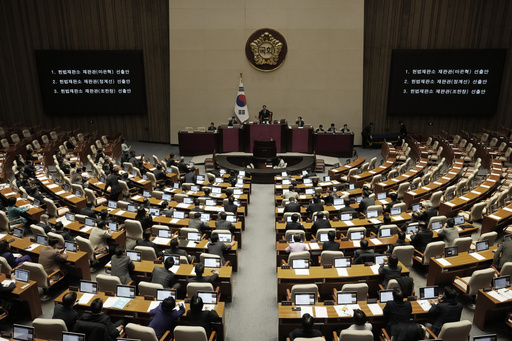SEOUL, South Korea — On Thursday, the leading opposition party in South Korea took a significant step by filing a motion aimed at impeaching the acting prime minister due to his reluctance to appoint justices to the Constitutional Court. This lack of appointments is critical as the court is set to review rebellion accusations against former President Yoon Suk Yeol, which relate to his brief declaration of martial law on December 3.
The appointments of the court justices have been stalled amid escalating tensions between the liberal opposition and the conservative party of Yoon. The potential impeachment of Prime Minister Han Duck-soo could exacerbate the current political deadlock, which has already disrupted high-level diplomatic efforts and rattled the nation’s financial markets.
In a session of the opposition-controlled National Assembly, motions were also passed to push for the immediate filling of the three vacant Constitutional Court positions. This decision comes as the court prepares for critical discussions on whether Yoon should be dismissed or reinstated. During a televised address, Han insisted that he would not proceed with the appointments unless there was bipartisan agreement.
National Assembly Speaker Woo Won Shik urged the prime minister to act quickly in appointment matters, criticizing Han’s call for bipartisan consent as a refusal that infringes upon the National Assembly’s authority to determine Constitutional Court justices.
Members of Yoon’s People Power Party largely boycotted the voting session, maintaining that Han should refrain from using presidential powers for these appointments so long as Yoon has not been officially ousted from office. The Democratic Party, which forms the main opposition, has accused the ruling conservatives of trying to manipulate the court proceedings to protect Yoon’s presidency. A vote on their impeachment motion against Han might occur as early as Friday. According to the Democratic Party’s floor leader, Park Chan-dae, Han’s statements reveal “he lacks both the qualifications to serve as the acting leader and the will to uphold the Constitution.”
Yoon’s presidential powers were suspended after the National Assembly voted for his impeachment on December 14, linked to his brief attempt at a power grab that precipitated weeks of political unrest within one of Asia’s most established democracies. To formally end Yoon’s presidency, a minimum of six out of the nine Constitutional Court justices must vote for his removal. Currently, three positions are unfilled due to retirements, and having a complete bench may increase the chances of a conviction.
The Constitutional Court plans to hold a pretrial hearing for Yoon’s case this Friday and has suggested that the acting president possesses the authority to appoint justices. The procedure for appointing justices involves three nominations directly from the president, while the Supreme Court head and the National Assembly nominate the other six, with formal appointments performed by the president.
The open seats on the court are designated for nominees from lawmakers, and South Korea’s Constitution indicates that the National Assembly “selects” these positions rather than merely recommending them. This distinction suggests that presidential appointments in these instances are more of a procedural duty instead of a significant power, as noted by several legal experts.
“The consistent spirit reflected in our Constitution and laws is that an acting president should focus on maintaining stability in governance to help the country overcome crises while refraining from exercising essential powers exclusive to the president, including appointments to constitutional institutions,” Han articulated. He stated he would delay appointing Constitutional Court justices until a mutual agreement is reached among the ruling and opposition parties.
Han has also faced disagreements with the Democrats regarding his vetoes of contentious agricultural legislation supported by the opposition, as well as his refusal to sanction bills that call for independent investigations into Yoon and corruption claims involving the former president’s wife, Kim Keon Hee.
If Han is indeed impeached, Choi Sang-mok, the nation’s deputy prime minister and finance minister, would assume his responsibilities. The impeachment process against Han may be complicated by legal uncertainties. While most South Korean officials can be impeached by a simple majority in the National Assembly, impeaching a president requires a two-thirds majority. The two parties have differing views on which standard should be applied to an acting president. With the Democratic Party holding 170 seats in the 300-seat National Assembly, it will need additional support from other parties, including Yoon’s own coalition, to achieve a two-thirds consensus.
While Yoon has been focused on his defense in the Constitutional Court, he has avoided several requests from law enforcement for questioning regarding the rebellion charges against him and has obstructed searches of his office. This Sunday, the Corruption Investigation Office for High-Ranking Officials plans to question Yoon after he ignored an earlier request to meet on Christmas Day. The inquiry is centered on accusations of abuse of authority and orchestrating a rebellion.
In connection to the martial law declaration, authorities have already detained Yoon’s defense minister, the police chief, and multiple military commanders involved in the failed attempts to impose martial law, a stark reminder of South Korea’s past under authoritarian leaders from the 1980s.
In a recent press conference in Seoul, Yoo Seung Soo, representing former Defense Minister Kim Yong Hyun, reiterated Yoon’s claim that his martial law declaration was intended to “sound alarm against … political abuse” orchestrated by an opposition party obstructing his agenda, asserting that it did not equate to a rebellion.




